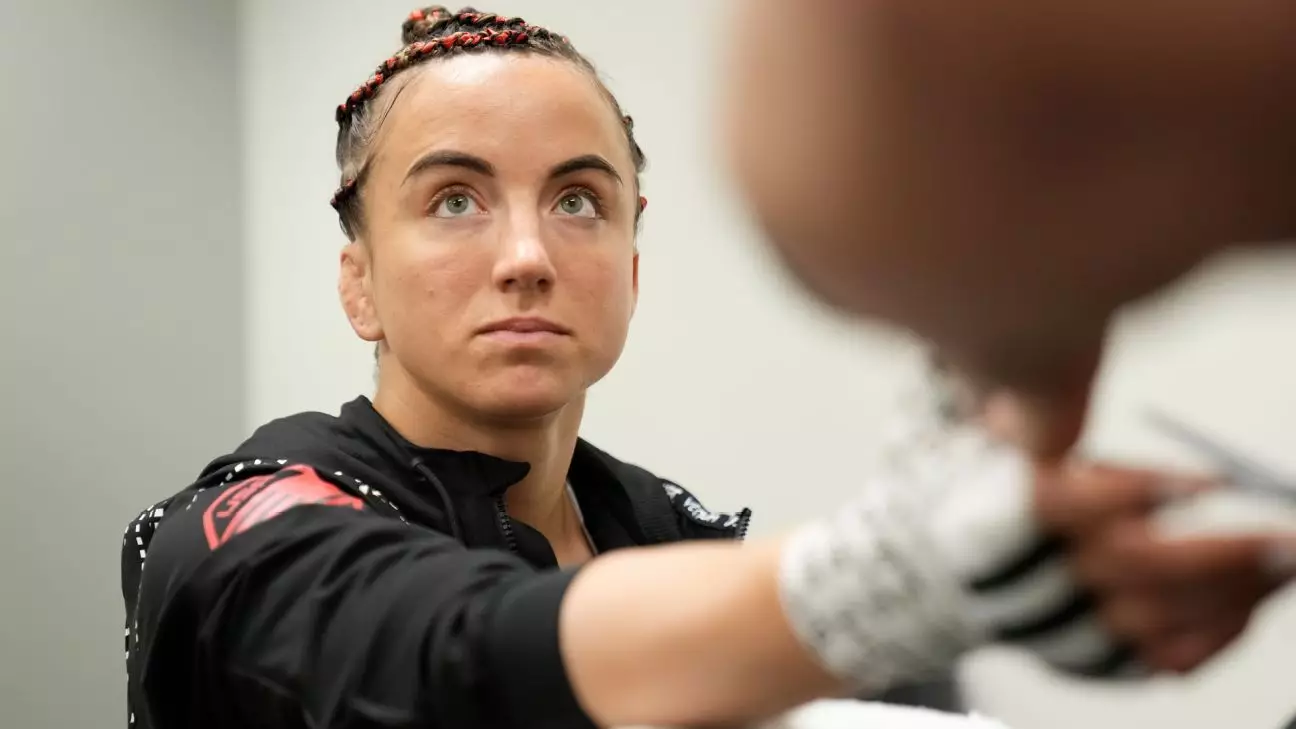On what was anticipated to be a thrilling main event at UFC Fight Night, Maycee Barber’s journey took an unexpected and troubling turn. Scheduled to fight Erin Blanchfield, Barber’s participation was abruptly halted due to a “medical emergency” just half an hour before she was set to enter the Octagon. This incident raises significant questions not only about athlete safety but also about the protocols surrounding immediate health resources within the high-stakes environment of professional fighting.
Barber, the No. 4-ranked flyweight, reported experiencing a medical complication during her warm-up routine. This complication was serious enough that it prompted immediate action from medical personnel and UFC commissioners, resulting in the fight’s cancellation. The timing was unfortunate; fans were already on their feet, eager for the bout, when they were instead met with news of Barber’s withdrawal. It underscores a critical vulnerability in live sports events, where an athlete’s well-being can pivot the excitement to anxiety within moments.
Understanding the Medical Mystery
In her communication with ESPN, Barber described a troubling episode that left both her and the medical staff scrambling for clarity. She mentioned symptoms that could be attributed to a “pseudo-seizure,” yet there was no definite diagnosis available at that moment. It’s a stark reminder that even the most well-prepared athletes are susceptible to unforeseen health crises that can express themselves in bewildering ways.
This incident further emphasizes the need for redoubled medical diligence in high-contact sports like MMA. The fact that Barber faced a similar issue in 2024—resulting in hospitalization—adds layers to the ongoing narrative of her health. Specialists have begun to examine her, but as she pointed out, the ambiguity surrounding her medical condition remains a looming shadow over her career. In an industry characterized by hyper-competition and relentless training schedules, Barber’s struggle is a testament to the uncharted waters that athletes must sometimes navigate.
The Emotional Toll of Abandonment
Amidst physical ailments, the psychological repercussions of such incidents can be equally overwhelming. Barber has expressed feelings of frustration intertwined with a profound sense of gratitude for her health. “I see people commenting, ‘Oh, I’m glad it happened to her and not to someone who is relevant,’” she remarked, highlighting the insensitivity that can often surface in the sporting community. Instead of derision or indifference, what athletes like Barber need is understanding and support, as they grapple not only with injuries but with public perception and career uncertainty.
Her candid reflections reveal a resilient spirit. While she acknowledges her frustrations regarding missed opportunities, she is also cognizant of how fleeting life can be, especially in an intense sport where every punch and kick comes with inherent risks. Barber’s grit in the face of adversity resonates with many athletes who have encountered similar hurdles and serves as a reminder of the human side of those who entertain us.
Facing the Path Ahead
During her period of recovery and uncertainty, Barber voiced a sense of hope for the future. Despite not being able to compete for a while, she recognizes the proactive measures taken by the UFC to ensure her health is the primary focus. The organization’s commitment to connecting her with specialists illustrates a positive step towards prioritizing athlete welfare above all. This supportive approach might set a precedent for how health issues are managed in the fast-paced and often unforgiving realm of professional sports.
With no concrete timeline for her return, the interim must be viewed not just as a waiting game but as an opportunity for Barber to gather strength and recover comprehensively. As she awaits answers, her determination remains undeterred. The Octagon has shown her both glory and pain, but her narrative is far from over.
In the realms of MMA and professional sports at large, Barber’s experience is a call to action—not just for her but for all athletes. It serves as a reminder that our shared humanity transcends the competitive fervor, and as such, every fighter deserves compassion as they navigate both triumph and tribulation.


Leave a Reply